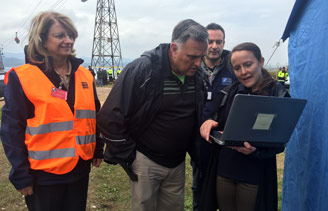NATO responds to disasters and incidents using science and technology
NATO’s Science for Peace and Security (SPS) Programme contributes to the Alliance’s efforts to project stability beyond its borders through practical cooperation in the fields of science and technology. Three SPS projects were tested in September at a disaster relief exercise.

The field exercise in Bosnia and Herzegovina offered the perfect setting to try out a number of life-saving technologies that have been developed in the framework of the SPS Programme. 34 NATO member and partner nations participated in the exercise, organised by NATO’s Euro-Atlantic Disaster Response Coordination Centre (EADRCC).
Next-Generation Incident Command System (NICS)
NATO Allies and partner nations in the Western Balkans will acquire, deploy and customise to their needs the NIC System to enhance situational awareness and help coordinate a response to incidents – whether natural or man-made – in their countries.
Supported by the SPS Programme, the system, once in place, will maximise real-time situational awareness and help find a coordinated, appropriate response to emergencies. It will also enhance interoperability among emergency response teams in the region.
NICS is a web-based command and control platform for incidents that facilitates collaboration among first responders. Sharing of information via mobile devices in areas of disadvantaged, intermittent or limited communications as quickly as possible will contribute to saving lives, reducing loss of property and resources, and protecting the environment. The system will be especially useful in a region prone to natural disasters.
The project is led by the Massachusetts Institute of Technology Lincoln Laboratory (MIT LL) in the United States together with civil emergency and disaster response agencies from Bosnia and Herzegovina, Croatia, Montenegro and the former Yugoslav Republic of Macedonia,1 which will develop and implement the NIC System. US Under Secretary Bill Bryan (Department of Homeland Security, Science & Technology) observed water rescue operations during the field exercise where this technology was used for information-sharing. He highlighted the importance of international cooperation, such as the web-based NICS platform which will assist first responders in remote areas by sharing data and information in real time.

Multinational telemedicine system for emergency situations
The SPS Programme has also supported the development of a multinational telemedicine system, enabling medical specialists from Finland, the Republic of Moldova, Romania, Ukraine and the United States to provide real-time recommendations to first responders at emergency scenes or in combat zones.
The telemedicine system can add a tremendous value in the aftermath of disasters to a region or nation in times of crises and incidents. It allows medical specialists to engage in major disasters or incidents across national borders. Portable medical kits enable first responders to connect to the system and to receive advice from medical specialists, even in remote areas.
Through the use of modern communications technologies, an international network of medical specialists will be able to assess patients, diagnose them and provide real-time recommendations. The right aid and care will be able to reach those who need it most quickly, with the potential to save many lives in disasters.
This project has produced a robust telemedicine system for disaster response with a concept of operations manual and e-learning portal for users. The system was successfully employed during field exercises in Bosnia and Herzegovina, Montenegro and Ukraine.
Smart I (eye) Advisory Rescue System (SIARS)
SIARS is a new state-of-the-art information system that can gather and organise medical data of injured patients and use satellite connections to transfer the data to the designated medical facility that will care for the injured. This information is also made available offline, when mobile or satellite communications are not available.
Synchronised with the efforts of the multinational telemedicine project, this hand-held, portable device can be taken into the battlefield and to disaster sites. The project was launched in 2014 and was led by experts from Slovenia and the former Yugoslav Republic of Macedonia.1
During the field exercise in September 2017 in Tuzla, Bosnia and Herzegovina, the telemedicine and SIARS systems were interconnected, allowing the transfer of medical data collected by the mobile sensor to the telemedicine kit.
Scientific cooperation
The SPS Programme enhances practical, result-oriented cooperation involving scientists, experts and government officials from NATO member and partner countries alike. Activities are based on scientific research, technological innovation and knowledge exchange.
- Turkey recognises the Republic of Macedonia with its constitutional name.
